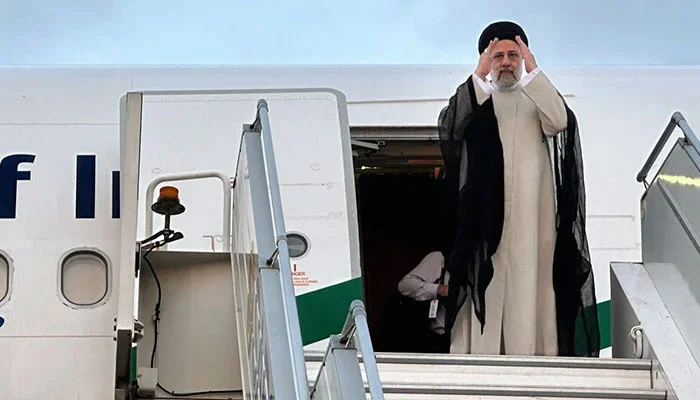
Coming in the wake of the massive but carefully calibrated Iranian retaliation against Israel and more sanctions being slapped on Iran, Iranian President Ebrahim Raisi’s visit to Pakistan provided an opportunity to send a cheerful image home and abroad that it is business as usual. Iran has been careful in avoiding the escalation of conflict with Israel, at least for now, as it faces economic difficulties, growing dissent in some sections of the population, and in the face of the naked fact, that the whole region might get engulfed with severe consequences for the survival of the current regime in Iran.
On the other side, the collation of regional and Western states under the American umbrella, is equally conscious of the risks of greater conflagration. At the same time, they confront Russia in Ukraine and Iran-backed non-state militant entities within the region. One may argue that the visit of the Iranian President had been scheduled quite in advance. Still, the fact that it happened on schedule and the wide range of subjects that he discussed with the Pakistan authorities add great significance to this visit.
There is also another background fact that we need to bear in mind. Early this year, in January, the two neighbors that rhetorically highlight common civilization, culture, and historical ties launched missile strikes against suspected terror groups into the territory of the other. Iran attacked a base or camp of Jaish-al Adl and Pakistan responded within days across the border. Both countries face economic and security challenges; their societies feel isolated and are engaged on multiple fronts. It made sense on both sides to forget the bitterness of their January episodes and work together to prevent similar incidents in the future. Postponing this visit would have sent the opposite message.
This was the first visit of any head of government after the February elections in Pakistan, which have produced more instability and uncertainty in the country. It is a great success for the struggling government of Prime Minister Shahbaz Sharif and brushes up an image of being connected with regional neighbors. Pakistan’s relations with Afghanistan and India for decades have been problematic. The rift with Iran in January and muted concerns about non-state actors involved in terrorism and seeking refuge on the other side have for long affected relations between the two countries, declaratory rhetoric of being close ‘friends’ notwithstanding.
Pakistan’s domestic, regional, and international challenges represent a difficult juggling act of balancing too many conflicting interests.
There is another dimension to fresh initiatives, like this visit, between Iran and Pakistan. There is much talk in Pakistan’s power corridors, business community, and political circles about rearranging national security and geopolitical priorities. The buzzword in new conversations is ‘geo-economics,’ which also lays the foundation of the China-Pakistan Economic Corridor (CPEC). Pakistan’s trade is the lowest in the region compared to other countries and this is not lost on those who wish to revive the economy running on borrowed time from the International Monetary Fund. Not to forget the generosity of Saudi Arabia and the Gulf states in hosting the most significant Pakistani manpower with its huge chunk of remittances, offsetting the current account deficit.
While Pakistan is attempting to enhance China’s investment in big-ticket infrastructure projects with a longer view of geopolitics and geoeconomics, and now apparently with Iran, it may not withstand the pressures from its conventional allies. Pakistan’s export markets, sources of loans and economic assistance, and most remarkably, the remittances that contribute more than its total export of commodities and services may not be happy if the ambitious agenda of the economic and security cooperation between Iran and Pakistan outlined in the joint communique is implemented. During the visit, the State Department sent an open warning, alerting Pakistan about possible sanctions if it went ahead with forging deeper cooperation with Iran. The recent and previous advice and counselling have effectively deterred the country from implementing the gas pipeline project with Iran. It is not just the threat of sanctions in this case, but the troubling nature of the agreement signed in haste in the waning months of President Asif Ali Zardari’s first tenure (2008-13). It was on the agenda of recent meetings. Still, we find a very oblique reference to it, which shows Pakistan may not be going ahead until the broader context of geopolitics in the region changes, particularly the softening or lifting of the sanctions against Iran.
Pakistan’s domestic, regional, and international challenges represent a difficult juggling act of balancing too many conflictive interests, pressures, and plans to sail through smoothly in the rough seas of regional geopolitics. That is symptomatic of its dependency, multiple failures, internal conflicts, and missed opportunities to reform itself. Whenever it makes a rational calculus of costs and benefits, it will find more comfort with its more traditional allies. Any radical departure would land it into rougher waters.
– Rasul Bakhsh Rais is Professor of Political Science in the Department of Humanities and Social Sciences, LUMS, Lahore. His latest book is “Islam, Ethnicity and Power Politics: Constructing Pakistan’s National Identity” (Oxford University Press, 2017). Twitter: @RasulRais
Courtesy Arab News


